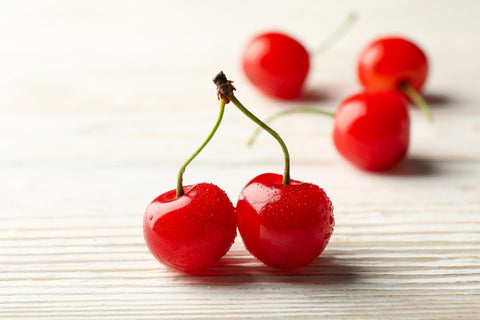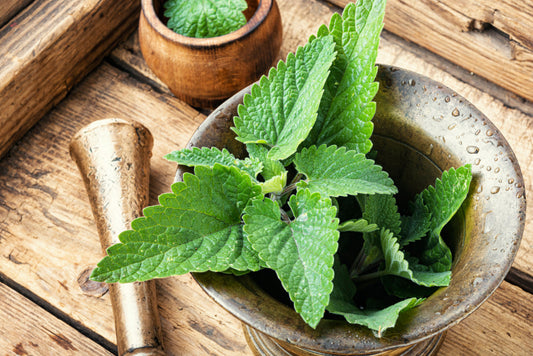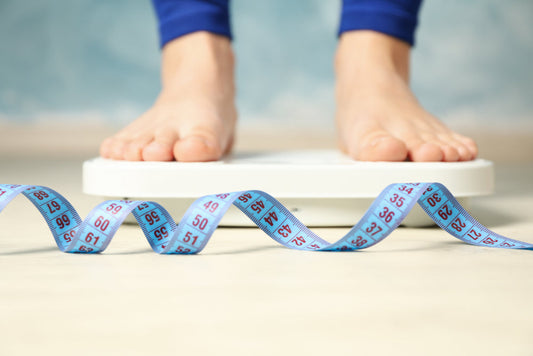The tart cherry carries an abundant supply of ingredients that can promote health and well-being. It may have such potential post-workout benefits as [24, 25]:
- Reduces muscle damage. The numerous antioxidant and anti-inflammatory polyphenol compounds in tart cherry may provide support in protecting muscles from exercise-induced damage.
- Improved muscle recovery. Tart cherry seems to speed up the recovery of muscle function.
Overview: Why is Tart Cherry Juice a Popular Recovery Drink?
Native to most of Europe and Southwest Asia, the tart cherry, also commonly referred to as sour cherry, is the fruit of the Prunus cerasus tree. It consists of several varieties, including:
- The dark-red Morello cherry
- The lighter-red Amarelle cherry
- The Montmorency cherry
- The Balaton cherry
Although tart cherry is best known as a recipe ingredient, it is also growing in popularity as a dietary supplement. [26, 27]
Indeed, tart cherries are bursting with compounds tied to potential health benefits such as anthocyanins, flavonoids, and phenolic compounds. [1]
Compared to sweet cherries, tart varieties may have higher total phenolic content. However, both varieties have been shown to have significant levels of anti-inflammatory and antioxidant compounds. [9]
Some of the benefits of tart cherry that are receiving increasing attention in medical research include [2, 24, 25]:
- Improved sleep due to its high melatonin content
- Enhanced muscle recovery
- Pain relief
How Drinking Tart Cherry Juice Might Help Muscle Recovery

If you're an active individual, drinking Montmorency tart cherry juice or a concentrate form might confer a number of benefits:
Increasing the availability of oxygen
Tart cherry's anthocyanin content may play a role in improving athletic performance by increasing peak oxygen capacity, which is especially relevant for muscles undergoing strenuous work. [3]
Antioxidant activity
Tart cherries contain potent antioxidant compounds like phenolics (one of the highest levels among all fresh plants) that are known to combat oxidative stress. [4, 5] This is particularly relevant for exercise since it can greatly increase the production of reactive oxygen species and uric acid. [6, 34]
Anti-inflammatory activity
Some anti-inflammatory polyphenol compounds in tart cherries have demonstrated activity through the inhibition of cyclooxygenase (COX) enzymes.
In particular, the flavonoids and isoflavonoids genistein and kaempferol have been shown to help inhibit COX-1 from triggering inflammatory pathways. [7]
In addition, the anthocyanin cyanidin-3-O-glucoside helps to inhibit both the COX-1 and COX-2 enzymes. [8]
Recovery Benefits of Tart Cherry Juice

Tart cherry concentrate, especially in juice form, is commonly used as a post-workout recovery supplement. It's meant to help reduce exercise-induced muscle damage and thus soothe pain, soreness, and speed recovery, especially among bodybuilders. [28]
And unlike many pre and post-exercise supplements, tart cherry actually has a solid amount of research evidence to back its supportive benefits, as you'll see in the following sections.
As a 2015 review paper of multiple studies on tart cherry summarizes: "daily consumption of tart cherries may attenuate inflammatory and oxidative responses to EIMD [exercise-induced muscle damage], leading to faster recovery after exercise bouts.” [10]
That said, not all studies agree on tart cherry's benefits for muscle recovery; some didn't find significant improvements in soreness or inflammatory markers from consuming tart cherry juice. [33]
Did you know? Allergy and sensitivity to cherries is surprisingly common. [11, 12]
Research
Animal Research
Animal research has demonstrated the potential of tart cherry to promote exercise recovery through:
- Diminishing muscle damage induced by exercise in horses. [13]
- Promoting antioxidant and anti-inflammatory activity in mice. [14]
Human Research
Although evidence is inconclusive, clinical research suggests tart cherries may help alleviate exercise-induced muscle damage. Here are some of the notable positive findings;
Tart cherry in as CherryActive® (60 ml) may improve muscle recovery after strength exercise
In this investigation, 10 well-trained, fasting male athletes consumed either 60 ml of tart cherry juice concentrate, CherryActive® (CA), or a fruit concentrate (FC) every day for 7 days before and 2 days after performing 2 trials of 10 sets of 10 single-leg knee extensions.
The maximum voluntary contractions (MVC) were shown to be significantly faster in the tart cherry concentrate group than in the fruit concentrate group. In addition, the resulting increase in one of the markers of muscle damage, protein carbonyls (PC), was lower in the tart cherry group than the fruit concentrate group.
- The researchers concluded that “Montmorency cherry juice consumption improved the recovery of isometric muscle strength after intensive exercise.” [15]
Tart cherry juice (10.5 oz) may moderately support muscle strength and help reduce muscle pain
In this randomized, blinded, placebo-controlled crossover investigation, 14 women with fibromyalgia took either a placebo juice or 10.5 ounces (oz) of a tart cherry juice drink standardized to at least 600 mg of phenolic compounds and 40 mg of anthocyanins daily for 10 days.
The tart cherry juice group was observed to have better strength maintenance; however, only a subset of participants experienced significant improvements in overall pain after ingesting tart cherry juice.
- The researchers concluded that “ingestion of tart cherry juice demonstrated marginal benefits in maintaining muscle strength but did not affect local muscle tenderness after eccentric stress. A subset of participants...had a significant reduction in overall pain.” [16]
Tart cherry as CherryPURE® (480 mg) may attenuate muscle soreness, strength loss, and muscle breakdown during resistance training
In this randomized, double-blind, placebo-controlled investigation, 23 resistance-trained men were given a placebo or 480 mg of tart cherry powder (CherryPURE®) daily for 10 days before completing ten sets of ten repetitions of back squats, and for 2 days after.
The tart cherry group reported reduced muscle soreness. In addition, blood markers of muscle damage—creatinine, bilirubin, AST, and ALT—were lower in the tart cherry group than placebo.
- The researchers concluded that “short-term supplementation of Montmorency powdered tart cherries surrounding a single bout of resistance exercise, appears to be an effective dietary supplement to attenuate muscle soreness, strength decrement during recovery, and markers of muscle catabolism in resistance trained individuals.” [17]
Tart cherry as CherryPURE® (480 mg) may attenuate muscle breakdown and soreness during aerobic endurance exercise
In this randomized, double-blind, placebo-controlled investigation, 27 endurance-trained athletes were given a placebo or 480 mg of tart cherry powder (CherryPURE®) every day for 10 days before running a half-marathon, and for 2 days after.
The tart cherry group was able to complete the half-marathon an average 13% faster than the placebo group, and also had attenuated markers of muscle breakdown—creatinine, urea/blood urea nitrogen, total protein, and cortisol—as well as an increase in antioxidant and anti-inflammatory activity. Reported quadriceps muscle soreness was also lower in the tart cherry group.
- Regarding the tart cherry's protective effect, the researchers wrote “short-term supplementation of Montmorency powdered tart cherries surrounding an endurance challenge attenuated markers of muscle catabolism, reduced immune and inflammatory stress, better maintained redox balance, and increased performance in aerobically trained individuals.” [18]
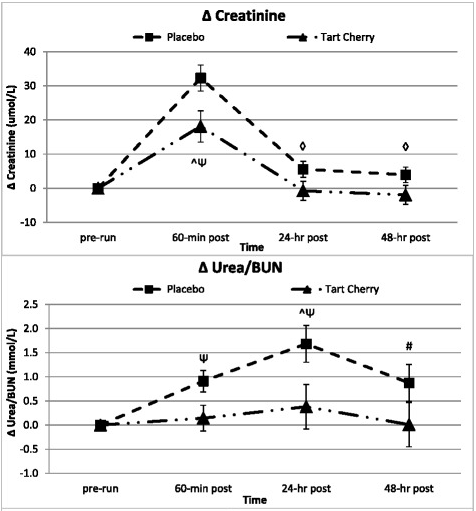
Tart cherry supplementation may ease muscle damage as suggested by a reduction in muscle damage markers such as creatinine (see the graph above). [Howatson et al., 2016, Figure 3]
Tart cherry juice may reduce muscle soreness and exercise-induced damage
In this randomized, placebo-controlled, crossover investigation, 14 male college students consumed 12 fluid ounces (fl oz) of either a placebo drink or a cherry juice blend twice a day for eight days.
A series of elbow flexions were performed by participants on day 4. The tart cherry group demonstrated significantly less strength loss and pain compared to the placebo.
- The researchers concluded that “these data show efficacy for this cherry juice in decreasing some of the symptoms of exercise induced muscle damage.” [19]
Tart cherry juice supports muscle recovery in marathon runners
In this investigation, 20 runners were given either a placebo or tart cherry juice every day for 5 days before, the day of, and for 2 days after a marathon.
The tart cherry group recovered muscular function significantly faster than the placebo. The tart cherry group was also reported to have reduced inflammation, 10% greater total antioxidant status, and decreased oxidative stress compared to the placebo.
- The researchers concluded that “cherry juice appears to provide a viable means to aid recovery following strenuous exercise by increasing total antioxidative capacity, reducing inflammation, lipid peroxidation and so aiding in the recovery of muscle function.” [20]
Tart cherry juice (355 ml) may reduce symptoms of exercise-induced muscle pain caused by endurance running
In this randomized, double-blind, placebo-controlled investigation, 54 runners ingested 355 ml bottles of either a placebo or tart cherry juice 2 times a day for 7 days before a relay.
Though both groups reported increased pain after running, the tart cherry group had a significantly lower pain increase when compared to the placebo group.
Those in the tart cherry group also claimed higher satisfaction with their pain reduction and accordingly demonstrated an elevated willingness to drink the juice in the future.
- The researchers concluded that “the administration of tart cherry juice for eight days reduced symptoms of exercise-induced muscle pain among runners participating in a vigorous endurance event.” [21]
Dosage for Muscle Soreness & Exercise Recovery
- There is no established optimal dosage for tart cherry juice due to lack of dose-response studies. However, successful clinical research trials have used doses of 400 – 1000+ mg or 60 – 350+ ml of tart cherry juice (the dose can vary based on the type of drink, e.g. concentrate is more potent so the dose is lower). [25, 28]
- Typical supplements provide from 400 – 615.5 mg of tart cherry (or 12 oz of a juice and water mix) standardized to approximately 20% anthocyanins.
Findings suggest that tart cherry juice works better when taken before intense exercise, rather than right after. In fact, it might produce best results when taken several days before an intense training session or a competition. [25]
Available Forms
- Tart cherry extract in tablet or capsule form
- Tart cherry juice
Tart cherry may have a synergistic effect with other potent natural antioxidants, such as blackberries, black currant, pomegranate, and ginger. [22]
A Smarter Way to Recover: Better Sleep Quality & Recovery with Supplement Stacks
At this point, we've explored how tart cherry juice shows promise for supporting muscle recovery; from reducing soreness and inflammation to improving sleep.
But there is a potential problem: drinking 12 oz of tart cherry juice every night may not be an ideal long-term strategy for everyone.
While tart cherry juice can be helpful, it's sugar-loaded and may be inconvenient to dose and consume consistently. [29]
This is where precision-dosed supplements offer a more streamlined solution.
Instead of relying on tart cherry juice alone, consider a recovery stack designed to work with your natural rhythm and complement a balanced diet — targeting more than just muscle soreness.
Why Choose a Supplement Stack Over Juice?
A high-quality supplement stack delivers tart cherry extract, plus other recovery-supporting ingredients, in standardized doses in capsules, without the calories.
This helps you target muscle recovery from multiple angles. [30]
Optimize Recovery with This Stack:
- Pre Lab Pro – Taken pre-workout, this low-stim, natural formula helps support your training and recovery goals. It does so by promoting clean energy and peak physical performance, without the harsh effects commonly associated with pre-workouts. Under the "hood" of Pre Lab Pro are beetroot powder, himalayan pink salt, lightly dosed coffea robusta caffeine, and other high-grade ergogenic ingredients. The formula is produced to the highest possible standards to make it suitable for both athletes and regular gym goers.
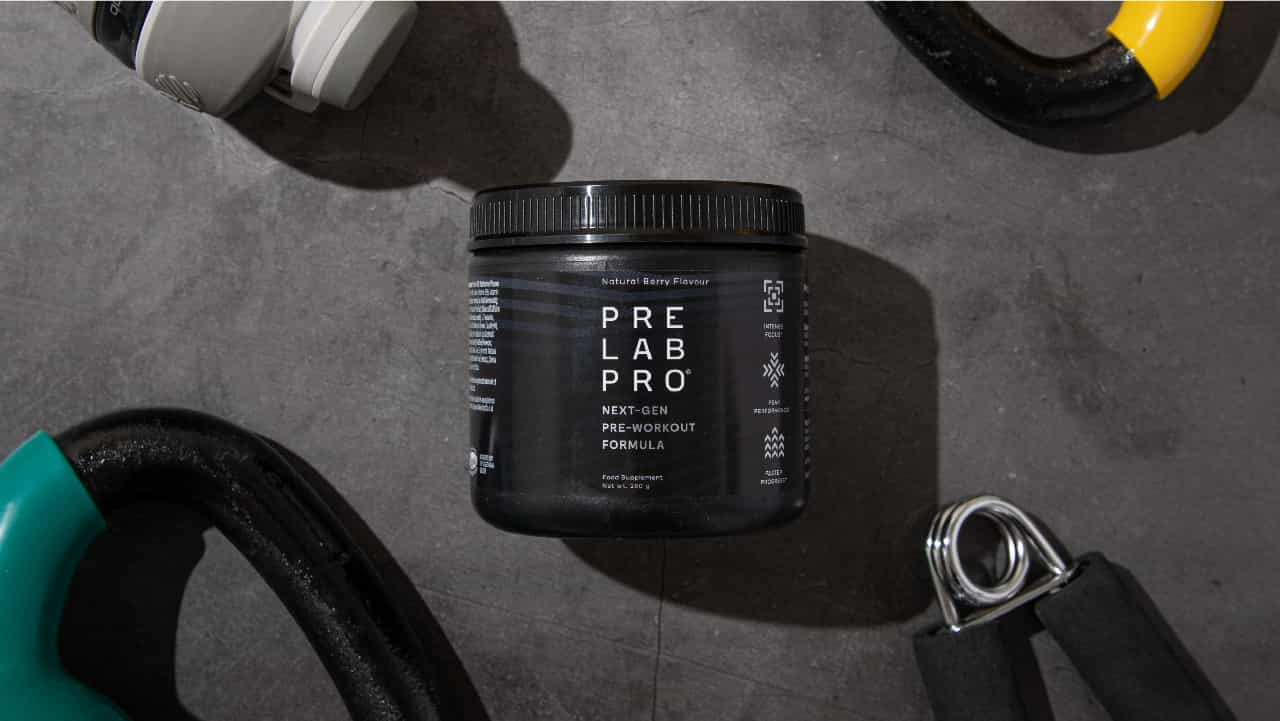
- Performance Lab Flex – Taken after training or in the evening, Performance Lab Flex is a plant-based joint supplement designed for tissue support, with natural ingredients that are safe for daily use. Flex complements tart cherry's anti-inflammatory effects with ingredients like turmeric, Boswellia Serrata (Indian Frankincense), glucosamine, and OptiMSM®.

- Performance Lab Sleep – Deep sleep is one of the most powerful recovery tools at your disposal. [31] Certain supplements may promote optimal rest. Taken before bedtime, Performance Lab Sleep provides night-time nutrition with clinically studied Montmorency tart cherry (as CherryPURE®) and natural ingredients like magnesium and lemon balm. [32] Performance Lab Sleep comes in prebiotic-infused NutriCaps® — no sugar, no juice, just convenient recovery support while you rest. [29]

How to Time Your Stack for Maximum Benefit:
- 30–45 min pre-workout: Take Pre Lab Pro to support your body in achieving peak performance during workout and speedy recovery afterwards.
- After training or with dinner: Take Flex to support joint comfort and mobility, inflammation relief, and musculoskeletal repair.
- 30–60 min before bed: Take Performance Lab Sleep for a natural supply of lemon balm, magnesium, and melatonin from tart cherry extract.
Final Thoughts
Overall, tart cherry's influence on inflammatory markers and strength recovery suggests multiple potential benefits for active individuals. [28]
Given the significant volume of positive research findings, you may want to consider weaving tart cherries into your post-workout supplement routine.
If you want to take your results a step further, try combining the premium tart cherry extract from Performance Lab Sleep with recovery-supportive nutrients from Pre Lab Pro and Performance Lab Flex. [17, 18, 20]
References
- Pandey, K. B., & Rizvi, S. I. (2009). Plant polyphenols as dietary antioxidants in human health and disease. Oxidative medicine and cellular longevity, 2(5), 270–278. https://doi.org/10.4161/oxim.2.5.9498
- Burkhardt, S., Tan, D. X., Manchester, L. C., Hardeland, R., & Reiter, R. J. (2001). Detection and quantification of the antioxidant melatonin in Montmorency and Balaton tart cherries (Prunus cerasus). Journal of agricultural and food chemistry, 49(10), 4898–4902. https://doi.org/10.1021/jf010321+
- Yarahmadi, M., Askari, G., Kargarfard, M., Ghiasvand, R., Hoseini, M., Mohamadi, H., & Asadi, A. (2014). The effect of anthocyanin supplementation on body composition, exercise performance and muscle damage indices in athletes. International journal of preventive medicine, 5(12), 1594–1600. https://pubmed.ncbi.nlm.nih.gov/25709796/
- Khoo, G. M., Clausen, M. R., Pedersen, B. H., & Larsen, E. (2011). Bioactivity and total phenolic content of 34 sour cherry cultivars. Journal of Food Composition and Analysis, 24(6), 772–776. https://doi.org/10.1016/j.jfca.2011.03.004
- Blomhoff R. (2004). Antioksidanter og oksidativt stress [Antioxidants and oxidative stress]. Tidsskrift for den Norske laegeforening : tidsskrift for praktisk medicin, ny raekke, 124(12), 1643–1645. https://pubmed.ncbi.nlm.nih.gov/15229712/
- He, F., Li, J., Liu, Z., Chuang, C. C., Yang, W., & Zuo, L. (2016). Redox Mechanism of Reactive Oxygen Species in Exercise. Frontiers in physiology, 7, 486.
- Wang, H., Nair, M. G., Strasburg, G. M., Booren, A. M., Gray, I., & Dewitt, D. L. (2000). Cyclooxygenase active bioflavonoids from Balaton tart cherry and their structure activity relationships. Phytomedicine : international journal of phytotherapy and phytopharmacology, 7(1), 15–19. https://doi.org/10.1016/S0944-7113(00)80016-1
- Reddy, M. K., Alexander-Lindo, R. L., & Nair, M. G. (2005). Relative inhibition of lipid peroxidation, cyclooxygenase enzymes, and human tumor cell proliferation by natural food colors. Journal of agricultural and food chemistry, 53(23), 9268–9273. https://doi.org/10.1021/jf051399j
- Kelley, D. S., Adkins, Y., & Laugero, K. D. (2018). A Review of the Health Benefits of Cherries. Nutrients, 10(3), 368. https://doi.org/10.3390/nu10030368
- Coelho Rabello Lima, L., Oliveira Assumpção, C., Prestes, J., & Sérgio Denadai, B. (2015). CONSUMPTION OF CHERRIES AS A STRATEGY TO ATTENUATE EXERCISE-INDUCED MUSCLE DAMAGE AND INFLAMMATION IN HUMANS. Nutricion hospitalaria, 32(5), 1885–1893. https://pubmed.ncbi.nlm.nih.gov/26545642/
- Reuter, A., Lidholm, J., Andersson, K., Ostling, J., Lundberg, M., Scheurer, S., Enrique, E., Cistero-Bahima, A., San Miguel-Moncin, M., Ballmer-Weber, B. K., & Vieths, S. (2006). A critical assessment of allergen component-based in vitro diagnosis in cherry allergy across Europe. Clinical and experimental allergy : journal of the British Society for Allergy and Clinical Immunology, 36(6), 815–823. https://doi.org/10.1111/j.1365-2222.2006.2492.x
- Ballmer-Weber, B. K., Scheurer, S., Fritsche, P., Enrique, E., Cistero-Bahima, A., Haase, T., & Wüthrich, B. (2002). Component-resolved diagnosis with recombinant allergens in patients with cherry allergy. The Journal of allergy and clinical immunology, 110(1), 167–173. https://doi.org/10.1067/mai.2002.125601
- Ducharme, N. G., Fortier, L. A., Kraus, M. S., Hobo, S., Mohammed, H. O., McHugh, M. P., Hackett, R. P., Soderholm, L. V., & Mitchell, L. M. (2009). Effect of a tart cherry juice blend on exercise-induced muscle damage in horses. American journal of veterinary research, 70(6), 758–763. https://doi.org/10.2460/ajvr.70.6.758
- Sarić, A., Sobocanec, S., Balog, T., Kusić, B., Sverko, V., Dragović-Uzelac, V., Levaj, B., Cosić, Z., Macak Safranko, Z., & Marotti, T. (2009). Improved antioxidant and anti-inflammatory potential in mice consuming sour cherry juice (Prunus Cerasus cv. Maraska). Plant foods for human nutrition (Dordrecht, Netherlands), 64(4), 231–237.
- Bowtell, J. L., Sumners, D. P., Dyer, A., Fox, P., & Mileva, K. N. (2011). Montmorency cherry juice reduces muscle damage caused by intensive strength exercise. Medicine and science in sports and exercise, 43(8), 1544–1551. https://doi.org/10.1249/MSS.0b013e31820e5adc
- Elliott, D. L., Kuehl, K. S., Jones, K. D., & Dulacki, K. (2010). Using an eccentric exercise–testing protocol to assess the beneficial effects of tart cherry juice in fibromyalgia patients. Integrative Medicine: A Clinician’s Journal, 9(6), 24–29. https://www.shorelinefruit.com/assets/docs/tart-cherry-juice-in-fibromyalgia-patients.pdf
- Levers, K., Dalton, R., Galvan, E., Goodenough, C., O'Connor, A., Simbo, S., Barringer, N., Mertens-Talcott, S. U., Rasmussen, C., Greenwood, M., Riechman, S., Crouse, S., & Kreider, R. B. (2015). Effects of powdered Montmorency tart cherry supplementation on an acute bout of intense lower body strength exercise in resistance trained males. Journal of the International Society of Sports Nutrition, 12, 41. https://doi.org/10.1186/s12970-015-0102-y
- Levers, K., Dalton, R., Galvan, E., O'Connor, A., Goodenough, C., Simbo, S., Mertens-Talcott, S. U., Rasmussen, C., Greenwood, M., Riechman, S., Crouse, S., & Kreider, R. B. (2016). Effects of powdered Montmorency tart cherry supplementation on acute endurance exercise performance in aerobically trained individuals. Journal of the International Society of Sports Nutrition, 13, 22. https://doi.org/10.1186/s12970-016-0133-z
- Connolly, D. A., McHugh, M. P., Padilla-Zakour, O. I., Carlson, L., & Sayers, S. P. (2006). Efficacy of a tart cherry juice blend in preventing the symptoms of muscle damage. British journal of sports medicine, 40(8), 679–683. https://doi.org/10.1136/bjsm.2005.025429
- Howatson, G., McHugh, M. P., Hill, J. A., Brouner, J., Jewell, A. P., van Someren, K. A., Shave, R. E., & Howatson, S. A. (2010). Influence of tart cherry juice on indices of recovery following marathon running. Scandinavian journal of medicine & science in sports, 20(6), 843–852. https://doi.org/10.1111/j.1600-0838.2009.01005.x
- Kuehl, K. S., Perrier, E. T., Elliot, D. L., & Chesnutt, J. C. (2010). Efficacy of tart cherry juice in reducing muscle pain during running: a randomized controlled trial. Journal of the International Society of Sports Nutrition, 7, 17. https://doi.org/10.1186/1550-2783-7-17
- Halvorsen, B. L., Holte, K., Myhrstad, M. C., Barikmo, I., Hvattum, E., Remberg, S. F., Wold, A. B., Haffner, K., Baugerød, H., Andersen, L. F., Moskaug, Ø., Jacobs, D. R., Jr, & Blomhoff, R. (2002). A systematic screening of total antioxidants in dietary plants. The Journal of nutrition, 132(3), 461–471. https://doi.org/10.1093/jn/132.3.461
- Kelley, D. S., Rasooly, R., Jacob, R. A., Kader, A. A., & Mackey, B. E. (2006). Consumption of Bing sweet cherries lowers circulating concentrations of inflammation markers in healthy men and women. The Journal of nutrition, 136(4), 981–986. https://doi.org/10.1093/jn/136.4.981
- Hill, J. A., Keane, K. M., Quinlan, R., & Howatson, G. (2021). Tart Cherry Supplementation and Recovery From Strenuous Exercise: A Systematic Review and Meta-Analysis. International journal of sport nutrition and exercise metabolism, 31(2), 154–167. https://doi.org/10.1123/ijsnem.2020-0145
- McHugh M. P. (2022). "Precovery" versus recovery: Understanding the role of cherry juice in exercise recovery. Scandinavian journal of medicine & science in sports, 32(6), 940–950. https://doi.org/10.1111/sms.14141
- Ortega, D. G., Coburn, J. W., Galpin, A. J., & Costa, P. B. (2023). Effects of a Tart Cherry Supplement on Recovery from Exhaustive Exercise. Journal of functional morphology and kinesiology, 8(3), 121. https://doi.org/10.3390/jfmk8030121
- Wang, C., Sun, W., Dalbeth, N., Wang, Z., Wang, X., Ji, X., Xue, X., Han, L., Cui, L., Li, X., Liu, Z., Ji, A., He, Y., Sun, M., & Li, C. (2023). Efficacy and safety of tart cherry supplementary citrate mixture on gout patients: a prospective, randomized, controlled study. Arthritis research & therapy, 25(1), 164. https://doi.org/10.1186/s13075-023-03152-1
- Vitale, K. C., Hueglin, S., & Broad, E. (2017). Tart Cherry Juice in Athletes: A Literature Review and Commentary. Current sports medicine reports, 16(4), 230–239. https://doi.org/10.1249/JSR.0000000000000385
- Hooper, D. R., Orange, T., Gruber, M. T., Darakjian, A. A., Conway, K. L., & Hausenblas, H. A. (2021). Broad Spectrum Polyphenol Supplementation from Tart Cherry Extract on Markers of Recovery from Intense Resistance Exercise. Journal of the International Society of Sports Nutrition, 18(1), 47. https://doi.org/10.1186/s12970-021-00449-x
- Wang, L., Meng, Q., & Su, C. H. (2024). From Food Supplements to Functional Foods: Emerging Perspectives on Post-Exercise Recovery Nutrition. Nutrients, 16(23), 4081. https://doi.org/10.3390/nu16234081
- Doherty, R., Madigan, S. M., Nevill, A., Warrington, G., & Ellis, J. G. (2021). The Sleep and Recovery Practices of Athletes. Nutrients, 13(4), 1330. https://doi.org/10.3390/nu13041330
- Esquivel, M. K., & Ghosn, B. (2024). Current Evidence on Common Dietary Supplements for Sleep Quality. American journal of lifestyle medicine, 18(3), 323–327. https://doi.org/10.1177/15598276241227915
- Beals, K., Allison, K. F., Darnell, M., Lovalekar, M., Baker, R., Nieman, D. C., Vodovotz, Y., & Lephart, S. M. (2017). The effects of a tart cherry beverage on reducing exercise-induced muscle soreness. Isokinetics and Exercise Science, 25(1), 53–63. https://doi.org/10.3233/IES-160645
- Zhang, T., Liu, W., & Gao, S. (2024). Exercise and hyperuricemia: an opinion article. Annals of medicine, 56(1), 2396075. https://doi.org/10.1080/07853890.2024.2396075
